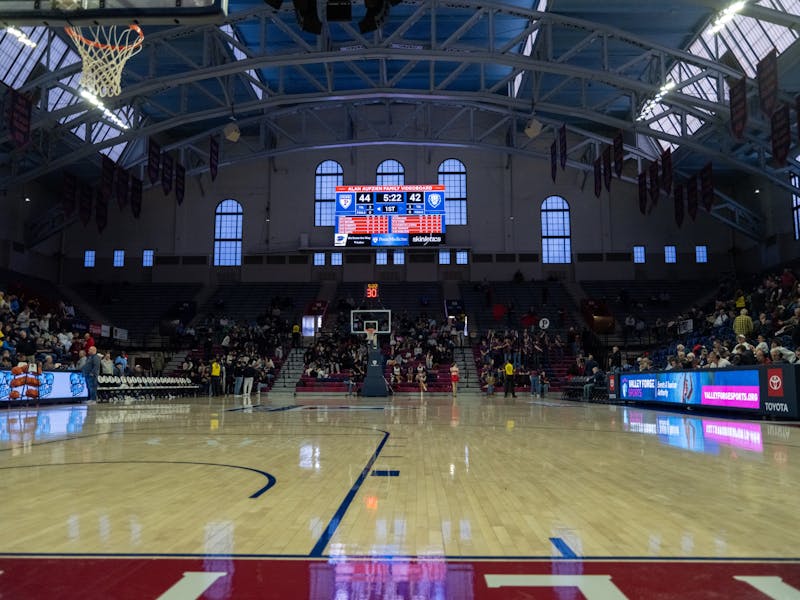Soon, even living abroad may not be an excuse for high school students to not interview with an alumnus as part of their application to Penn.
The Office of Alumni Relations recently launched the Penn Alumni Interview Program, with the goal of interviewing 100 percent of applicants by 2015. The new program replaces the Secondary School Committee, which conducted interviews under the Office of Admissions until this year’s application cycle.
Last year, the SSC interviewed about 50 percent of applicants. Penn Alumni Interview Program Director Patrick Bredehoft hopes the new program can do even better this year.
“For a student who has the opportunity to speak face to face with an alumnus, that might be the only time that they actually get to meet someone who’s associated with Penn.” Bredehoft said. “Not everybody has an admissions officer who comes to their school. Not everybody has the opportunity to visit campus or to come to a Penn information session.”
In the past, the chances that an applicant would receive an interview depended largely on whether interviewers were active near their hometown, Bredehoft said. Because the push to 100 percent will force Penn to expand its outreach to areas that were previously underserved — for example, the SSC was not able to conduct interviews in Montana, North Dakota or South Dakota last year — the University has created a new virtual interview committee, which is responsible for interviewing applicants via Skype and phone. The virtual committee has already interviewed 75 applicants.
“It makes me so excited that we are bringing interviews to students who otherwise might not have had interviews, knowing how meaningful these interviews are to these students,” said 2012 College graduate Rachel Cohen, director of the new virtual committee. “It brings Penn to them and it makes students really excited.”
The virtual committee will also interview international students to whom the program is unable to offer an in-person interview. While many international students fall into this category, in-person interviews have been conducted in areas such as India — where last year every single applicant was offered an interview — for several years.
“To me, there doesn’t seem to be a huge difference between in-person and Skype, because via Skype you can pick up a lot of information you’d be able to pick up in-person from body language to eye contact,” said 2011 College graduate Ali Huberlie, who has already conducted virtual interviews for the committee. “I think it’s a fantastic alternative for students who don’t have alumni in their area.”
The program will also be expanding its on-the-ground outreach by recruiting new interviewers through existing alumni networks, as well as through advertisements in the Alumni Gazette and the Alumni Relations online newsletter. For the first time, interviewers will also be asked to conduct at least four interviews per year.
“Our goal is, whenever possible, to conduct a face-to-face interview,” Bredehoft said. “We think that has the greatest likelihood of giving a student a really positive impression of Penn. It allows them to ask questions, to not have to worry about a bad connection or cell phone line. But that’s not always possible.”
While some regions have previously been underserved by interviews, others have been at or near the 100-percent mark for several years. In Washington state, the local interview committee was able to offer every applicant an interview last year, said Co-Chair of the Puget Sound Committee David Blum.
“Many private colleges and universities in the U.S. have given up doing personal interviews, period,” Blum said. “The fact that we’re doing it more and more, instead of less and less, is a really big plus for us.”
In general, the interview serves two purposes, said Dean of Admissions Eric Furda. It provides additional information about an applicant to admissions officers, but also provides students an opportunity to learn more about the school. As a result, interviews can help increase yield — the percentage of admitted students who decide to enroll at Penn, Furda said.
“Equally as important is to represent the face of the school to someone who very often has not been to campus, who if they’re admitted to Penn are obviously going to be admitted to other places and obviously are going to have other choices in regular decision,” Blum said.
Washington’s yield has been at or above the national average for the last six years, Blum added, which he attributes partially to the prevalence of interviews in the state.
The new program will also expand training, since for the first time new full-time staff members at Penn will be able to travel to meet with interviewers around the world, Bredehoft said. The University has also upgraded the online portal for alumni to receive interview assignments and to submit feedback for the admissions office.
“It frees up admissions to focus on recruitment, evaluation and selection, and allows us to really work on the volunteer management side — getting people signed up, informing people about the process and making sure interviews are happening the way they’re supposed to,” Bredehoft said.
While the 100-percent mark is a lofty goal, Bredehoft is confident that the new program will put interviewers in a better position to reach it.
“We’re optimistic,” he said. “It’s going to involve a significant amount of recruitment, but Alumni Relations is really well set up to do that. There are all of these other volunteer networks that already exist, and there are lots of people who’ve been very eager to get involved.”
The Daily Pennsylvanian is an independent, student-run newspaper. Please consider making a donation to support the coverage that shapes the University. Your generosity ensures a future of strong journalism at Penn.
DonatePlease note All comments are eligible for publication in The Daily Pennsylvanian.








